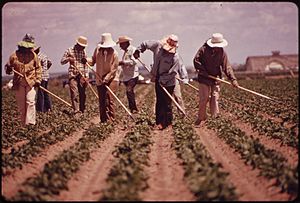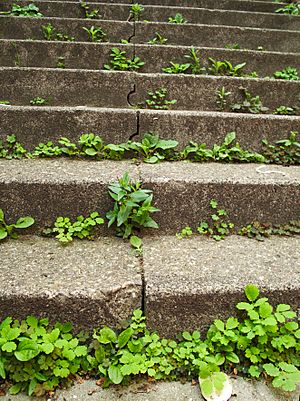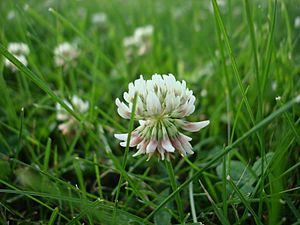Weed facts for kids
A weed is a plant that people consider unwanted in a certain place. It's growing where it's not supposed to be! This idea of "weeds" is super important in farming. Farmers want to grow specific crops, like corn or wheat, in their fields. Any other plant growing there is seen as a weed. Some weeds can even cause problems for people, acting like pests.
You can find weeds in many places people control, like farms, orchards, gardens, lawns, and parks. But here's a cool fact: the word "weed" isn't a scientific term for a type of plant. A plant that's a weed in one spot might be perfectly welcome somewhere else! For example, a plant that grows on its own after a crop is harvested is called a "volunteer plant" and is often seen as a weed. Some plants we call weeds are even grown on purpose in gardens, and then they're sometimes called beneficial weeds. The term "weed" can also describe any plant that grows really fast or spreads easily outside its natural home.
Sometimes, the word "weed" is even used for things other than plants, like animals that can live anywhere and reproduce quickly.
Weed control is a big deal in farming and gardening. People use different ways to get rid of weeds. This includes pulling them by hand with hoes, using machines called cultivators, covering them with mulch to block sunlight, or even burning them. Farmers also use special chemicals called herbicides. Other methods include changing which crops they grow each year or leaving fields empty for a while to reduce weed numbers.
Contents
Why Weeds Can Be Good
"What would the world be, once bereft,
of wet and wildness? Let them be left.
O let them be left; wildness and wet;<
Long live the weeds and the wilderness yet."
Even though "weed" usually sounds like a bad thing, many plants called weeds actually have helpful qualities!
- Food and Medicine: Lots of weeds, like dandelions and lamb's quarter, are edible. You can eat their leaves or roots! Burdock is common worldwide and is sometimes used in soup and medicine in East Asia.
- Helping Other Plants: Some weeds attract good insects that eat harmful pests, protecting crops. Weeds can also hide crops from pests, making it harder for the pests to find their food.
- Protecting Soil: Weeds can act like a "living mulch." They cover the ground, which helps the soil hold onto water and stops it from washing away.
- Improving Soil: Weeds can make the soil healthier. Dandelions, for example, have long roots that bring up important nutrients like calcium and nitrogen from deep underground. Clover plants have special bacteria in their roots that add nitrogen to the soil, acting like natural fertilizer. Dandelions also help break up hard soil, allowing crop roots to grow deeper.
- Beautiful Flowers: Some garden flowers actually started out as weeds in farm fields! People liked their flowers so much that they started growing them on purpose. The corncockle is an example; it used to be a common weed in European wheat fields but is now grown in gardens.
Plants Often Called Weeds
White clover is a plant that some people see as a weed in their lawns. But in many other places, it's very useful! It provides food for animals, helps make honey, and adds nitrogen to the soil.
Here's a short list of some plants that are often thought of as weeds:
- Amaranth – Also called "pigweed." It's an annual plant that makes many seeds. It's also a very healthy and tough food source.
- Bermuda grass – A perennial grass that spreads with runners, underground stems, and seeds.
- Bindweed
- Broadleaf plantain – A perennial plant that spreads by seeds. These seeds can stay in the soil for many years.
- Burdock – A biennial plant.
- Common lambsquarters – An annual plant.
- Cogongrass – One of the most harmful weeds in the world, found in huge areas in warm climates.
- Creeping charlie – A perennial plant that spreads quickly with long, creeping stems.
- Dandelion – A perennial plant whose seeds are spread by wind. It grows fast and can handle dry weather.
- Goldenrod – A perennial plant.
- Japanese knotweed
- Kudzu – A perennial vine.
- Leafy spurge – A perennial plant with underground stems.
- Milk thistle – An annual or biennial plant.
- Poison ivy – A perennial plant that can cause itchy rashes.
- Ragweed – An annual plant.
- Sorrel – An annual or perennial plant.
- Striga
- St John's wort – A perennial plant.
- Sumac – A woody perennial plant.
- Tree of heaven – A woody perennial tree.
- Wild carrot – A biennial plant.
- Wood sorrel – A perennial plant.
- Yellow nutsedge – A perennial plant.
Many invasive weeds were actually brought to new places on purpose a long time ago. People didn't think they would cause problems back then; they thought they would be helpful!
How People Control Weeds

Weeds are plants that people don't want in a certain spot. For a very long time, people have worked hard to control weeds for many reasons. Learning how to control weeds is a very advanced area of study.
The ways people control weeds depend on how the weeds grow and where they are. For example, the methods used to control weeds in a field of food crops might be different from those used on a golf course. This is because people worry more about chemicals used on food.
Weeds can be grouped by how long they live. They are usually either annuals or perennials. An annual weed grows from seeds that fell the year before. Perennial weeds can grow back from old roots, underground stems, or seeds.
Understanding how weeds grow is also important for controlling them without chemicals. This includes things like plowing, carefully removing weeds from the surface, growing other helpful plants, and stopping weed seeds from building up in fields. For example, amaranth is a plant you can eat, but modern farming often sees it as a weed. It makes tons of seeds (up to a million per plant!) that can last for many years, and it grows very fast. People trying to control amaranth often say, "This year's seeds become next year's weeds!" However, others value amaranth as a tough plant that can be a good food source.
Some people actually like weeds for how strong they are, how wild they seem, and even for the work they provide. As Christopher Lloyd, a famous gardener, once wrote:
Many gardeners will agree that hand-weeding is not the terrible drudgery that it is often made out to be. Some people find in it a kind of soothing monotony. It leaves their minds free to develop the plot for their next novel or to perfect the brilliant repartee with which they should have encountered a relative's latest example of unreasonableness.
Images for kids
-
A dandelion is a common plant all over the world. It's an example of a plant that's a weed in some places (like lawns) but not in others (like when it's used as a leaf vegetable or herbal medicine).
See also
 In Spanish: Maleza para niños
In Spanish: Maleza para niños
 | Leon Lynch |
 | Milton P. Webster |
 | Ferdinand Smith |




